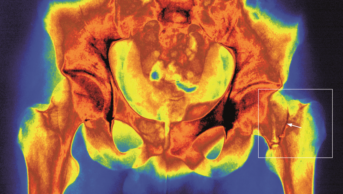
Janine Wiedel Photolibrary / Alamy Stock Photo
There is no evidence that postmenopausal hormone replacement therapy (HRT) is associated with a decreased risk of Alzheimer’s disease or dementia, a large, 20-year follow-up study has found.
Women are more likely to develop Alzheimer’s disease than men and it has been suggested that this could be because of a decline in the sex hormones after the menopause. However, previous studies into whether HRT is therefore protective against dementia have provided conflicting results.
The current study, published in Neurology
[1]
(online, 15 February 2017), included data on more than 8,000 women living in Finland and showed no overall relationship between use of HRT and Alzheimer’s disease incidence.
“While women still need to talk to their doctors about the risks and benefits of taking hormone therapy during menopause, this study did not provide strong evidence that taking hormone therapy can protect women from Alzheimer’s disease,” says lead study author Bushra Imtiaz from the University of Eastern Finland in Kuopio.
The research used registry and questionnaire data on 8,195 women who were followed up every five years between 1989 and 2009. All the women were aged from 47 to 56 years at the beginning of the study.
Registry-based information on hormone therapy was available from 1995 onwards, and a total of 4,401 women self-reported HRT use during the 20-year study period. Overall, 227 developed Alzheimer’s disease during follow-up.
The results showed that neither register-based nor self-reported HRT use was associated with Alzheimer’s disease risk. The same was also true when the researchers considered any type of dementia diagnosis from hospital discharge records, and when they broke down the findings according to the type of HRT women received.
When they stratified women by duration of HRT use, the team did find that those who had used HRT for more than ten years had around a 47% lower risk of Alzheimer’s disease compared with women who had never taken HRT. However, this was only true for self-reported HRT use and not registry-based HRT use.
The authors say this could suggest that HRT has a protective effect if begun early within a ‘critical window’ but it could also reflect reverse causation or that women who developed Alzheimer’s disease tended to self-report longer durations of HRT use. The relationship was also weaker when they looked at all types of dementia diagnosis rather than Alzheimer’s disease specifically.
Louise Walker, research officer at UK charity the Alzheimer’s Society, says that further research is still needed to clarify any protective effect of HRT on the risk of the disease.
“The evidence around whether HRT affects dementia risk has so far been conflicting,” she says.
“This large and long-term study indicates there is no strong evidence that HRT influences the risk of dementia but more work needs to be done to obtain conclusive results. The reasons behind this uncertainty could be due to differences in the type of therapy given or the age at which the women first received treatment.”
While women should have up-to-date information on the risks and benefits of HRT, not enough is known to reliably understand how this relates to dementia, she adds.
References
[1] Imtiaz B, Tuppurainen M, Rikkonen T et al. Postmenopausal hormone therapy and Alzheimer disease. Neurology 2017; 88:1-7. doi: 10.1212/WNL.0000000000003696


